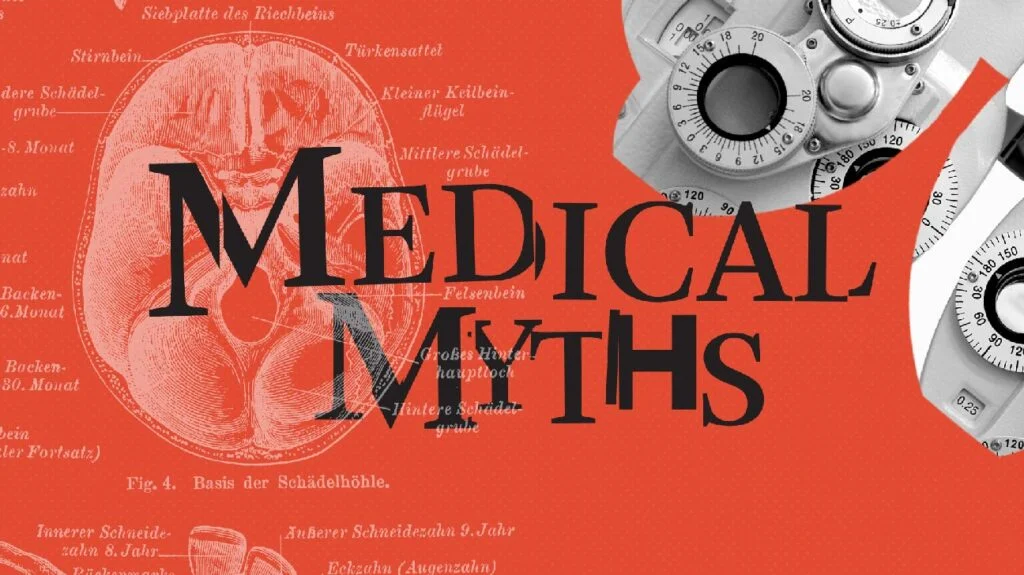
Table of Contents
Weight Loss Myth – Discover the truth about losing weight with this in-depth reference to medical facts and myths. Uncover 25 captivating subjects, frequently asked questions, and professional advice to help you lose weight safely and successfully.
INTRODUCTION
We frequently encounter a variety of medical fallacies around weight loss in our pursuit of a fitter and healthier lifestyle. These false beliefs have the potential to impede our advancement and add unnecessary complexity to the journey.
Many people consume more calories than they burn off during the holidays. Thus, it is not unusual to gain a little additional weight during this time of year.
Traditionally, January is a month of transition, when a lot of people embark on weight-loss programs. In light of this, we address a few widespread misunderstandings.
READ MORE: DesignSuite AI Personal – Create e-books, Flip-books, Reports and collections (Coupon “DESIGN20“)- GET INSTANT ACCESS

MEDICAL MYTHS TO WEIGHTLOSS

We’ll explore the most widespread myths in this thorough guide and provide you with professional advice on how to distinguish reality from fiction.
Many of us may have weight-loss goals as 2021 gets underway. That being said, there is a lot of misinformation about dieting and weight loss.
We take a direct approach to medical disinformation in our series on medical myths. In order to separate fact from fiction, MNT uses professional expertise and peer-reviewed research, providing clarity in the myth-ridden field of health journalism.
A lot of people are interested in weight loss, and there are a lot of misconceptions about it. Enumerating each of these myths one by one
Myth 1: Losing Weight Is the Result of Starving Yourself
Starving oneself is not a sustainable or healthy approach to losing weight, despite what many people think. Even though you might initially lose weight, it will likely be primarily water weight, and this could negatively impact your metabolism. For long-term effects, instead prioritize portion control and a balanced diet.
It’s possible that the proverb “breakfast is the most important meal of the day” is correct, but it doesn’t appear like skipping breakfast will help you lose weight.
This tactic is based on the idea that cutting back on one meal a day lowers total calorie intake. It’s not an easy story to tell, though.
In a 2010 publication titled Trusted Source, food intake data from 2,184 individuals ages 9 to 15 was examined. Twenty years later, the researchers asked for the same information.
Data from people who had never skipped breakfast or had only done so in maturity were compared to data from people who had skipped breakfast both as children and as adults.
Individuals who skipped breakfast as children and adults were more likely to have higher total cholesterol, higher fasting insulin levels, and bigger waist circumferences than the other groups.
People who miss breakfast occasionally overeat the remainder of the day to make up for the loss. But according to a 2013 study (Trusted Source), skipping breakfast does not result in consuming more food at noon. “Skipping breakfast may be an effective means to reduce daily energy intake in some adults,” the scientists write in their conclusion.
But lunch was the only meal these researchers kept an eye on the subjects’ consumption of food—not dinner. Furthermore, there were only 24 participants in the study, thus it is dangerous to extrapolate firm conclusions from the results.
A much larger study from 2007In a study involving over 25,000 teenagers, Trusted Source sought to determine whether missing breakfast was associated with being overweight. The researchers also evaluated the effects of alcohol consumption and levels of inactivity.
The researchers discovered that skipping breakfast was more strongly associated with being overweight than either alcohol use or physical inactivity.
A comprehensive review and meta-analysis that appeared in the journal Obesity Research & Clinical Practice in 2020 support the findings. Following a review of 45 prior investigations, the authors came to the following conclusion:
“Overweight and obesity are linked to skipping breakfast, and skipping breakfast raises the risk of overweight and obesity.”
READ MORE: LOSE WEIGHT – NO MORE STARVATION DIETS

Myth 2: “Fat-burning” foods can help you lose weight.
There are foods that are described as “fat-burning.” It seems too good to be true, and in most cases, it is.
Certain foods, such pineapple, ginger, onions, avocados, celery, asparagus, chiles, broccoli, green tea, and garlic, are said to increase metabolism and aid in fat burning.
However, there isn’t much scientific proof (trusted source) that these foods can aid in weight loss.
Although crash diets can cause quick weight loss, they are not healthy and do not last. Making small, gradual changes to your food and way of life is safer and more successful.
Myth 3: Is Taking Supplements the Magic Fix?
Supplements for weight loss are frequently promoted as miracle cures, but the hype is rarely realized. Exercise on a regular basis and a balanced diet are essential.
Supplement proponents assert that their products aid in the body’s fat-burning process. As a matter of fact, these are typically either hazardous, ineffective, trusted sources, or both.
“Hundreds of products that are marketed as dietary supplements but actually contain hidden active ingredients […] contained in prescription drugs, unsafe ingredients in drugs that have been removed from the market, or compounds that have not been adequately studied in humans,” according to a report from the Food and Drug Administration (FDA).
READ MORE: DesignSuite AI – Drive Traffic & DFY Ads Service – GET INSTANT ACCESS
Senior regulatory manager Jason Humbert of the FDA continues, saying:
Additionally, weight loss items masquerading as supplements have been discovered to contain hazardous mixtures of unidentified substances, including active compounds present in prescription blood pressure, antidepressant, and seizure drugs.
Myth 4: Diets low in fat promote weight loss.
Naturally, items labeled as low-fat or reduced-fat will generally have a lower fat content. These goods do, however, occasionally make up for it with extra salt or sugar. Label checking is essential.
It’s also important to remember that “reduced fat” just refers to a product’s fat content being lower than that of the full-fat version, not that it equates to “low fat.”
Check-In: A nutritious component of every diet is fruit. They supply fiber and vital vitamins. Despite the fact that they naturally contain carbohydrates, the advantages outweigh the drawbacks.
Myth 5: You must not nibble.
Some people might view snacking as the ultimate sin of dieting. But occasionally, nibbling can really make it easier for folks to control how many calories they consume. What matters isn’t so much how much one snacks as what one snacks on.
There might be more to snacking than meets the eye. Some individuals snack because they are hungry, while others nibble because they are bored. Some people snack on celery, while others snack on cookies.
For example, having a piece of fruit or some low-fat yogurt in between meals may help curb cravings and prevent overindulging in meals or turning to higher-energy snacks.
Several studies According to a reliable source, those who are obese eat more frequently than those who are not. In this instance, if weight loss is the desired outcome, making the transition from unhealthy to nutritious snacks may help.
Snacking has a variety of effects; it can help or hurt attempts to lose weight, and sometimes it has no impact at all.
Previous studies A 2007 study by Trusted Source examined the connection between snacking and weight loss. One group of participants in the year-long trial was instructed to eat three meals a day without snacking. Three meals and three snacks were required each day for a second group. Every day, the individuals in both groups used the same amounts of energy.
The scientists concluded the study with no discernible difference in weight reduction between the two groups, suggesting that snacking had no beneficial or detrimental effects.
The “relationship between eating frequency and weight loss maintenance” was the subject of another 2011 study. The researchers sought out participants who had previously been obese or overweight but had since maintained healthy weights.
The eating habits of these people were contrasted with those of obese individuals and healthy-weight individuals who had never been overweight.
Researchers discovered that individuals who were overweight consumed the fewest snacks, whereas those who were healthy consumed more.
“Eating frequency, particularly in regard to a pattern of three meals and two snacks per day, may be important in weight loss maintenance,” the authors stated overall.
Myth 6: No sweets are permitted.
This builds on the myth mentioned before. While cutting out sweet, high-fat snacks completely is needless and may perhaps have the opposite effect, restricting them is undoubtedly crucial.
As stated by the British Heart Foundation:
“It won’t work to deprive yourself of everything you enjoy eating. Eventually, you’ll give in to temptation and stop trying. Nothing is wrong with treating yourself to a treat every now and then.
Myth 7: Certain sugars are not as good as others.
There’s a whisper that less processed sugars, such those in honey or maple syrup, are healthier than white sugar. Actually, our bodies process sugar in the same way regardless of the source. All sugars are converted to monosaccharides in the stomach.
It is more crucial to pay attention to the amount of sugar in any dish than to how sugar is processed. Every gram of sugar contains about 4 calories.
READ MORE: How Might Food Consumption of Carbs and Fats Affect Men’s vs. Women’s Longevity? (R100)

Myth 8: Eliminate all sugar.
Continuing from the last misconception, we are aware that sugar contains a lot of calories. That being said, cutting sugar out of one’s diet completely is not necessary for someone trying to lose weight.
Like anything else, moderation is essential. Alternatively, it can be wise to stay away from goods that have added sugar.
Myth 9: Artificial sweeteners are considered healthy.
Many choose aspartame or other low- or no-calorie sweeteners in an effort to reduce their intake of sugar. Although there may be fewer calories ingested as a result, some research has connected artificial sweeteners—also known as nonnutritive sweeteners—to weight gain.
An exhaustive analysis the impact of sweeteners on cardiometabolic health was examined in 37 published studies with a total of 406,910 participants, as reported in a 2017 meta-analysis and Trusted Source.
The researchers state that “observational data suggest that routine intake of nonnutritive sweeteners may be associated with an increased risk of cardiometabolic diseases and an increased body mass index.”
Not all research, nevertheless, has come to this conclusion (trusted source). The impact of nonnutritive sweeteners on weight loss and metabolic health is still a topic of discussion among researchers and medical professionals.
Myth 10: You can target particular areas of fat.
Some people are more motivated to reduce body fat in specific places, like their thighs or abdomen. This targeting is actually not feasible. Everybody’s body reacts differently to losing weight, and we have no control over which fat cells will disappear first.
Nonetheless, it can appear more region-specific when weight loss is combined with toning workouts in a specific area.
Myth 11: This diet craze is quite good.
Numerous diets have come into vogue only to go out of style, creating space for new ones. In summary, according to the Centers for Disease Control and Prevention (CDC) Trusted Source:
“[Fad] diets tend to be unhealthy, restrict nutritional intake, and end in failure over time.”
MORE COMMON WEIGHT LOSS MYTH

READ MORE: BREAST ENHANCEMENT – HOW I SAVED TONS OF MONEY WITH BREAST ACTIVES – 40% OFF
Myth 12: Herbal Teas Promise to Help You Lose Weight
Herbal teas can improve digestion, but they won’t make you lose weight. They are not a miracle cure, but they can be a component of a healthy lifestyle.
Myth 13: A detox diet is necessary.
Since your body is capable of naturally detoxifying itself, detox diets are frequently superfluous. Prioritize eating a balanced diet to help your body’s internal cleansing procedures.
Myth 14: The Loss of Weight Is Linear
Progress in losing weight is rarely linear. You might encounter both fluctuations and plateaus. Remain dedicated to your objectives, and keep in mind that it’s a journey filled with ups and downs.
Myth 15: Cardio Only Helps Burn Fat
Although cardiovascular exercise is a great way to burn calories, strength training is just as vital. In the long run, muscle helps with weight loss because it burns more calories while at rest.
Myth 16: You Need to Eat Little Meals Often
It has been proven false that eating small, frequent meals will increase metabolism. Meal frequency has no discernible effect on weight loss. Pay attention to total caloric consumption.
Myth 17: Losing Weight Is Simple and Fast
Losing weight takes commitment, patience, and work. It’s a sustained lifestyle shift rather than a quick fix. Have perseverance and patience.
Myth 18: The Enemy Is Carbs
No, carbohydrates are not harmful. Carbs are necessary for your body to function. Selecting complex carbohydrates, such as whole grains, is crucial, and excessive consumption of simple carbohydrates, such as sugary cereals, should be avoided.
Myth 19: Supplements Don’t Hurt
Certain weight-loss supplements are neither efficient nor safe. See a medical practitioner prior to beginning any supplementation.
READ MORE – The Ultimate Style Guide: Best Fashion News 2023

Myth 20: You Must Eliminate All Sugar
It is not necessary to cut out all sugar from your diet. You can still enjoy the natural sugars found in fruits but try cutting back on the added sugars from processed meals.
Myth 21: When on a diet, you can’t eat out.
Dining out does not require you to give up on your diet. There are lots of places that provide healthy selections, so you may choose carefully when eating out.
Myth 22: Losing Weight With Water Equals Losing Fat
Although it’s just temporary, losing water weight might give the appearance of rapid weight loss. Real fat loss is a slow process that calls for long-term adjustments.
Myth 23: Pills for Losing Weight Are Safe
Supplements for weight loss should only be taken under a doctor’s supervision. They might not be appropriate for everyone and may have negative effects.
Myth 24: Willpower Is the Only Factor in Weight Loss
Although willpower is crucial, genetics, hormones, and environment also affect weight reduction. Seek assistance and establish a successful environment.
Myth 25: Losing Weight Is Not Maintainable
It is possible to maintain weight loss with the appropriate tactics. Prioritize long-term behaviors and mentality changes above band-aid solutions.
Myth 26: You Can Cut Fat Spot-Relatedly
It is untrue to say that you can spot and reduce fat in particular body parts. It takes a combination of food and activity to decrease total body fat in order to shed fat in a specific location.
Myth 27: Saturation Causes Fat
Your body needs dietary fat to function correctly. What counts are the kind and amount of fat. Nuts and avocados are good sources of healthy fats that can help with weight loss.
Myth 28: Eating Less Aids
In actuality, missing meals might backfire. It may cause you to overeat later in the day by slowing down your metabolism. To maintain an active metabolism, choose well-balanced meals and nutritious snacks on a regular basis.
Myth 29: Consuming food late at night makes you gain weight.
The overall number of calories you take throughout the day is more important than the timing of your meals. Gaining weight won’t always result from eating late at night.
Myth 30: Every calorie is the same.
Every calorie is not made equally. The quality of the calories is just as important as their amount. Your body benefits more from nutrient-dense foods like fruits, vegetables, and lean proteins than it does from empty calories found in sugary snacks.
Myth 31: It’s Not Possible to Savor Your Favorite Foods
You can lose weight and still eat the things you love. Portion control and moderation are essential. Self-deprivation can result in overeating and desires.
Myth 32: Workout on Its Own Is Sufficient
Exercise is important for overall health, but diet plays a big role in weight loss as well. The best strategy incorporates a balanced diet along with regular exercise.
Q&As OF WEIGHT LOSS MYTH
Is it acceptable to cheat meals when trying to lose weight?
Sure, having the occasional cheat meal can fit into a well-rounded weight-loss plan. They can lessen feelings of deprivation and help satiate cravings, but moderation is essential.
How can I increase my metabolism to lose weight more quickly?
Focus on gaining lean muscle through strength training, eat frequent, balanced meals, drink plenty of water, and obtain adequate sleep to increase your metabolism.
Which diet works best for losing weight?
A diet that you can stick to over time is the most beneficial. It should be customized to your unique requirements and tastes and comprise a range of nutrient-dense meals.
Does stress have an impact on weight loss?
Yes, stress has an effect on losing weight. Elevated levels of stress can trigger emotional eating and hormonal imbalances that impact metabolism. It’s critical to stress management for general health.
Does calorie count help with weight loss?
Calorie counting is one strategy, but it’s not the only one. Other useful techniques include controlling portion sizes, eating mindfully, and concentrating on the quality of your meal.
How can I maintain my motivation while trying to lose weight?
Maintaining motivation might be difficult. Remind yourself of your motivations for wanting to lose weight, track your progress, ask friends or a support group for help, and set reasonable goals.
READ MORE: EXCLUSIVE OFFER – GET YOUR LUXURY PRODUCTS @ YOUR DOORSTEEP. VISIT STORE NOW.
THE MEMENTO OF WEIGHT LOSS MYTH
In general, weight loss might be difficult. Our bodies are designed to absorb and store energy since they evolved during periods of greater famine. Nevertheless, a lot of us live in a world where calories are easily obtained, and our bodies continue to retain this energy as though it were outdated.
Reducing calories and exercising are often the most effective ways to lose weight. Having said that, before starting a new weight-loss program, individuals with chronic illnesses, such as diabetes and obesity, should consult with their physicians.
It’s also important to keep in mind that any “weight loss miracle” is definitely not miraculous, so if anything looks too good to be true, it usually is. Although most foods are not intrinsically unhealthy, it’s a good idea to limit your intake of high-fat and high-sugar foods.
Success in the weight reduction industry depends on being able to distinguish reality from fantasy. By dispelling these 25 medical weight loss misconceptions and offering professional advice, we hope to provide you the confidence to make wise decisions that will help you become a healthier version of yourself.




























Leave a Reply